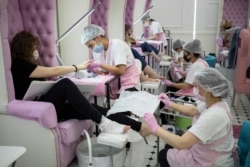After more than 2 months of shutdown due to the coronavirus, Russia’s capital sprung back to life this week — with city authorities lifting restrictions on most business closings and stay at home rules for Moscow’s 12 million plus residents.
Moscow Mayor Sergei Sobyanin announced the policy shift Monday — arguing the city had made great progress against the virus, with the pandemic “slowly but surely” on the decline over the past few weeks.
“The struggle isn’t over. But nonetheless, I want to congratulate you with our latest victory and big step towards a return to normal life,” added Sobyanin in a video address published to his official blog.
Indeed, the city has seen its daily infection numbers halved since the peak of the virus in May — with a government task force reporting just over 1,195 new cases Wednesday.
But the capital also remains the epicenter of the outbreak, with around 40% of Russia’s more than 493,000 coronavirus cases.
The count put Russia third in global rankings Wednesday for COVID-19 infections, behind the United States and Brazil.
Putin’s plan, Take Two
Amid the uncertain epidemiological picture were suggestions that Kremlin politics, rather than science, lay behind the decision to reopen the capital.
The lifting of restrictions comes as President Vladimir Putin moved forward with plans to hold key political events upended by the outbreak earlier this spring.
A military parade on Red Square initially to mark the 75th anniversary of the Soviet Union’s victory over Nazi Germany in World War II last month was pushed back to June 24th amid concerns over the contagion.
Then there is a rescheduled nationwide constitutional referendum July 1st. The vote’s key provision removes presidential term limits — opening the door for President Putin to remain in power well into the next decade.
In the choreographed summer schedule, critics saw political ambitions driving public health decisions.
“Well that’s it. We’ve beaten the coronavirus, ” wrote Kira Yarmash, a spokeswoman for opposition leader Alexey Navalny in a post to Twitter. “Just two weeks before the parade and the vote…how convenient!” Yarmash wrote.
Journalist Dmitry Nabosha argued the public was being let out just long enough to vote and give Mr. Putin the result he desired. “8:00 pm on July 1st and it’s back to quarantine,” wrote Nabosha on his Facebook page.
Independent Russian media have openly posited that Mayor Sobyanin was pressured by the Kremlin into reopening the city ahead of schedule, a charge Kremlin spokesman Dmitry Peskov dismissed during his press briefing Tuesday.
“Why is it too fast? Some restrictions are in place, others will be lifted in the course of a week or two. It’s not a full cancellation,” said Peskov.
“Sobyanin used his authority and analyzing the situation on the ground…made the decision,” added Peskov.
The Mayor’s Shift
The new rules mark a distinct turnaround for Mayor Sobyanin, who became — or was made — the face of the government effort to fight the pandemic early on.
It was left to Sobyanin — rather than President Putin — to introduce unpopular measures such as self-isolation requirements and a digital pass system strictly limiting movement around the city.
Supporters credited the mayor with keeping fatalities lower than comparatively large metropolises like New York and London — even as western media organizations have raised serious doubts over how accurately Russia counts its dead.
And there were plenty of gaffes, too. An intrusive city tracking app went haywire and randomly fined residents. Sobyanin’s attempt to schedule walks for residents building by building was mocked widely as out of touch with reality.
Yet few could argue Sobyanin was not at least trying to stop the virus.
As recently as late May, Sobyanin insisted on strict guidelines for easing the coronavirus lockdown, arguing public safety could only be assured once new infection rates had fallen dramatically.
But by this week all that had changed.
The digital passes were gone. Beaty salons and barber shops were open. Crowds were on the sidewalks. Traffic was back at its usual hum.
“Yesterday these roads were empty. Now look at all these people,” grumbled Roman, a taxi driver, who admitted he had largely ignored city requirements to wear a mask and gloves. “Why bother? They do it just to scare people,” he tells VOA.
Indeed, Sobyanin may have simply have bowed to the inevitable: with summer weather temperatures arriving over the weekend, the mayor was in effect lifting restrictions that increasingly few were bothering to follow.
Either way, Muscovites appeared to welcome the change in policy and weather — with many ignoring ongoing requirements to wear a mask in public as they strolled city streets and gathered in groups outside.
Only surveying the crowds, some observers predicted an inevitable second wave of infections to come.
“Hold this damn parade and damn vote at any price. And how many of you get sick or die, makes no difference,” wrote Echo of Moscow Radio’s ombudsman Anton Orekh in a scathing post about Moscow’s sudden return to normal.
“There’s nothing to celebrate or be happy about,” added Orekh. “If you can — stay home and take care of yourself three times more than before.”





